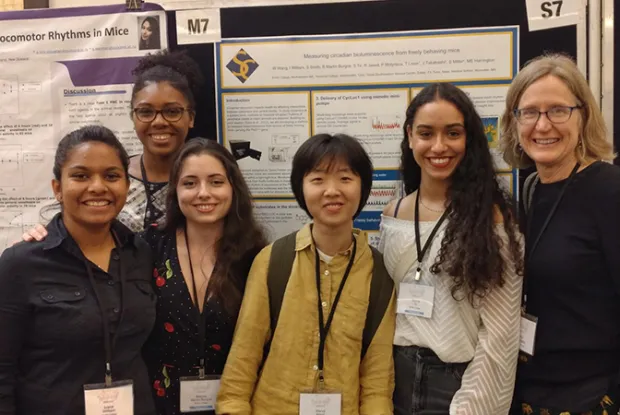
Retinal ganglion cells in the eye, stained with a dye crystal placed on the optic nerve. The dye dissolves in the nerve cell membranes and migrates back to the cell bodies and dendrites in the retina. The image was made by the late Stefan Bodnarenko, a professor of neuroscience at Smith.
Neuroscience
Neuroscience is the study of nervous systems, touching diverse fields such as biology, psychology, biochemistry, philosophy and computer science. Students of neuroscience are also diverse. For example, some students are primarily interested in questions of how consciousness arises from the human brain, while others become fascinated with the inner workings of individual nerve cells, and still others with the development of these complex neural systems. Neuroscience students at Smith receive excellent preparation for a wide range of careers, including research, medicine, biotechnology, pharmacology and more. The breadth of neuroscience encourages learning about many areas of science.
Requirements & Courses
Goals for Majors in Neuroscience
Neuroscience is the study of nervous systems, touching diverse fields such as biology, psychology, biochemistry, philosophy and computer science. Students of neuroscience are also diverse. For example, some students are primarily interested in questions of how consciousness arises from the human brain, while others become fascinated with the inner workings of individual nerve cells, and still others with the development of these complex neural systems. Neuroscience students at Smith receive excellent preparation for a wide range of careers including research, medicine, biotechnology, pharmacology and a variety of other careers. The breadth of neuroscience encourages learning about many areas of science.
Students who major in neuroscience graduate with deep knowledge of neuroscience and several well-developed skills. They learn fundamental principles about the nervous system at multiple levels of analysis, from molecular and cellular aspects through systems, behavioral and cognitive levels. They receive extensive training in scientific writing, data analysis and public speaking, including presentations in classes and often also at regional and national scientific meetings. All of our students engage in research-based laboratory work, either through research projects in our upper-level laboratory courses, or in many cases through one-on-one mentoring in a faculty research laboratory. Finally, students begin to read primary research papers in our sophomore methods course and then continue to develop their skills in analyzing and critiquing current articles in our upper-level courses and seminars. They graduate from Smith with the skills and understanding that prepares them for the next steps in their careers.
Neuroscience Major
Requirements
Fifty-one to fifty-six credits
- Core
- BIO 132/BIO 133
- CHM 111 or CHM 118
- CHM 222
- NSC 210
- NSC 230
- SDS 210
- Two biology courses: BIO 200, BIO 202 or BIO 230. ESS 260 or ESS 261 may replace BIO 200 with the major adviser's permission.
- Three advanced lecture or research laboratory courses, at least one of which must be a lab course and one a lecture course, from these options:
- Lecture courses: NSC 310, NSC 314, NSC 318, NSC 320,
BIO 300, BIO 302 or BIO 308/ NSC 308 - Lab courses: NSC 324, NSC 325, NSC 334sb, NSC 335,
BIO 303, BIO 330, BIO 363 or ESS 310 (with lab)
- Lecture courses: NSC 310, NSC 314, NSC 318, NSC 320,
- One seminar: NSC 312 (any topic), BIO 323so, PSY 314cf, PSY 326pr or ESS 300md
- One elective: NSC 130/ PSY 130, PSY 218, PSY 227 or PSY 230, or a course selected in consultation with the adviser
- One course in the major may be taken with the S/U grading option.
- A student who places out of required courses with AP or IB credits is expected to replace those courses with others offered in the major.
Neuroscience Minor
Six courses
- BIO 132
- NSC 210
- NSC 230
- Three electives, chosen in consultation with the minor advisor from courses that count towards the NSC major. At least two courses must be at the 300 level.
- PSY 202 can substitute for NSC 230, but only if one of the 300-level elective courses is also a lab course.
- Students with AP or IB credit in Biology can opt to omit BIO 132 and take an additional elective.
Courses
NSC 130/ PSY 130 Clinical Neuroscience (4 Credits)
Offered as NSC 130 and PSY 130. Introduction to brain-behavior relations in humans and other species. An overview of anatomical, neural, hormonal and neurochemical bases of behavior in both normal and clinical cases. Discussions include the biological basis of sexual behavior, sleep, emotions, depression, schizophrenia, autism, ADHD and neurological disorders. The course focuses on clinical cases in human neuroscience. Open to entering students. Enrollment limited to 60. Natural Science; Social Science
Fall, Spring
NSC 210 Fundamentals of Neuroscience (4 Credits)
The course provides an introduction to the organization and function of the mammalian nervous system along with an exploration of the brain using multiple levels of analysis ranging from molecular to cognitive and behavioral approaches. The course develops an appreciation of how brain cells interact to orchestrate responses and experiences. Emphasis is placed on the cellular and molecular physiology of the nervous system with a focus on retinal phototransduction and mechanisms governing memory. The material is presented at a level accessible for life science majors. Prerequisites: BIO 132 (may be concurrent) or AP BIO. Enrollment limited to 30. Natural Science
Fall, Spring, Variable
NSC 230 Experimental Methods in Neuroscience (4 Credits)
A laboratory course exploring anatomical research methods, neurochemical techniques, behavioral testing, design of experiments and data analysis. Prerequisites: CHM 111 or CHM 118; and NSC 130/ PSY 130 or NSC 210 (may be concurrent), or equivalent. Restrictions: Not open to seniors. Enrollment limited to 16. Natural Science
Fall, Spring
NSC 310 Human Neuroscience (4 Credits)
This course covers contemporary methods and questions in human neuroscience across the lifespan. This course deeply examines several areas of human neuroscience rather than a broad overview of the field. Students focus on the following domains of study: memory, neural plasticity, decision-making and social cognition. The course examines human neuroscience methods and research to understand domain in 1) healthy young adults 2) across development and 3) in aging, disease and brain damage. The course is designed around class discussion and critical analysis of research findings. Prerequisite: NSC 210 and one statistics course from any department. Enrollment limited to 20. Natural Science
Fall, Spring, Annually
NSC 312ad Seminar: Topics in Neuroscience- Adversity (4 Credits)
This course covers the current understanding of the impact of early life adversity on the brain and how this can lead to differences in cognitive and mental health outcomes. The course deeply examines different dimensions of early life adversity. Students focus mainly on studies in humans, but look to the animal literature for grounding in mechanisms. Students examine current theoretical models of how adversity impacts the brain, the latest literature testing these models, how these differences in brain development may impact children in the long term and factors that may provide resilience for those experiencing adversity. Prerequisite: NSC 210. Restrictions: Juniors and seniors only; NSC 312 may be repeated once with a different topic. Enrollment limited to 12. Instructor permission required. Natural Science
Fall, Spring, Variable
NSC 312al Seminar: Topics in Neuroscience-Alzheimer's Disease (4 Credits)
This seminar focuses on Alzheimer's Disease research from multiple vantages. The course begins with the human experience, how this neurodegenerative disease impacts individuals, their families and society. Then the class studies clinical symptoms and neuropathology. Students select topics within cellular and molecular topics for their final research paper. Prerequisites: NSC 210 and a 200-level Biology course. Restrictions: Juniors and seniors only; NSC 312 may be repeated once with a different topic. Enrollment limited to 12. Instructor permission required. Natural Science
Fall, Spring, Variable
NSC 312cb Seminar: Topics in Neuroscience-Communication and the Brain (4 Credits)
Communication is an indispensable feature of everyday lives. To communicate, the brain must generate, receive, and interpret signals like speech and facial expressions. This seminar examines how this occurs, with a focus on visual and auditory mediums. Students examine early and current scientific literature to understand the neural mechanisms of communication from a variety of angles, from gene expression and cellular physiology to brain regions and brain-wide activity. Additionally, students examine what is currently known about the neural mechanisms behind communication disorders in humans. The course also examines animal systems that have developed methods of communication very different from humans. Prerequisite: NSC 210. Restrictions: Juniors and seniors only; NSC 312 may be repeated once with a different topic. Enrollment limited to 12. Instructor permission required. Natural Science
Fall, Spring, Variable
NSC 312ct Seminar: Topics in Neuroscience-Brains, Bias, and Society: Neuroscience in Context (4 Credits)
This seminar examines the intersections of neuroscience, society, and social justice. Through extensive readings and discussions, the course critically examines how neuroscience has been used to reinforce social inequities and how factors such as racism, poverty, and social stressors impact brain function. The course covers a range of topics including racism, sexism, neurodiversity, economic inequity, criminal justice, and more. Students engage with these issues through weekly readings, independent research, and a final project. This course is ideal for students interested in critically analyzing scientific fields and their implications for social equity. Prerequisite: NSC 130/ PSY 130 or NSC 210 (may be concurrent.) Restrictions: Juniors and seniors only; NSC 312 may be repeated once with a different topic. Enrollment limited to 12. Instructor permission required.(E) Social Science
Spring, Variable
NSC 312nd Seminar: Topics in Neuroscience-Cellular and Molecular Mechanisms of Neurodegenerative Diseases (4 Credits)
The course examines the cellular and molecular mechanisms behind neurodegenerative diseases and describes the basic anatomy and physiology of the brain and nerves. Students dive into the roles that cell quality control plays in neuronal health by exploring the function of the proteasome, lysosome and autophagy in neurodegeneration. Additionally, the course looks at how inflammation can perpetuate and maintain the chronic state seen in neurodegeneration by examining the roles that microglia and astrocytes play in brain health. Students gain experience in the areas of literature search, scientific format and preparation of an oral presentation. Prerequisite: NSC 210. Restrictions: Juniors and seniors only; NSC 312 may be repeated once with a different topic. Enrollment limited to 12. Instructor permission required. Natural Science
Fall, Spring, Variable
NSC 312oe Seminar: Topics in Neuroscience-Brains Beyond the Classroom-Neuroscience Outreach and Engagement (4 Credits)
This course trains students to design and deliver neuroscience outreach activities for public audiences, with a focus on youth engagement. Students gain foundational neuroscience knowledge and apply it through the creation of interactive, age-appropriate workshops. Emphasis is placed on science communication, inclusive educational design, and ethical public engagement. Through team-based projects, guest speakers, and mentorship, students develop leadership, collaboration, and communication skills. The course culminates in a community outreach event, where students present their activities to middle school participants, serving as STEM role models and ambassadors. Prerequisite: NSC 210. Restrictions: Juniors and seniors only; NSC 312 may be repeated once with a different topic. Enrollment limited to 12. Instructor permission required. Natural Science
Fall, Spring, Variable
NSC 314 Neuroendocrinology (4 Credits)
This course investigates how the brain regulates the production and release of hormones, as well as how hormones act on the brain to affect behaviors such as aggression, affiliation, parenting, sexual behavior, feeding and learning. Prerequisites: NSC 210 and one of BIO 200, BIO 202 or BIO 230, or equivalent. Enrollment limited to 20. Natural Science
Fall, Spring, Variable
NSC 318 Systems Neurobiology (4 Credits)
Systems neurobiology is the study of how networks of neurons function and how these networks mediate sensation, movement and higher-order functions such as language. The development of new technologies to image the brain, measure and manipulate neural activity, and understand whole-brain patterns of gene expression means our knowledge of systems neurobiology is growing rapidly. Thus, the major goal of this class is to teach what types of questions to ask and what approaches to use to find their answers. Course material focuses primarily on the neuroanatomy, functional organization and evolution of the vertebrate brain. Students demonstrate their mastery of course material through group work, discussions of the primary literature and short writing projects. Prerequisites: NSC 210 and BIO 200 or BIO 202 or equivalent. Enrollment limited to 20. Natural Science
Spring, Alternate Years
NSC 320 Sex and the Brain (4 Credits)
In this course students journey into how sex (and where relevant, gender) can and should be considered as a variable in biomedical research, with a focus on brain function and health. The course covers how and why the sex of research subjects has historically been overlooked and how males have been considered the “default” model systems for whole species and beyond. The class discusses the dimensionality of sex as a variable, learning about sex-related factors (such as chromosomes and hormones) that impact humans dynamically. The class explores research demonstrating within-sex variability, cross-sex similarities and sex-related differences in brain structure, function and health in various species, while critically evaluating this work through the lenses of rigor, ethics and equity. Prerequisite: NSC 210. Enrollment limited to 25. (E) Natural Science
Fall, Spring, Annually
NSC 324 Research in Behavioral Neuroscience (3 Credits)
This course consists of laboratory investigations of neuroscience research questions linking brain and behavior. Each semester, students may take on different questions in behavioral neuroscience. Students spend the first portion of the semester learning techniques, discussing relevant articles and developing research proposals. This lays the foundation for open-ended research in the second part of the semester. Prerequisites: NSC 230 or PSY 202. Enrollment limited to 12. Instructor permission required. Natural Science
Fall, Spring, Alternate Years
NSC 325 Research Methods in Cellular Signaling (3 Credits)
This is an interactive lab class giving students hands-on experience working with techniques used in the study of cellular neuroscience. Techniques include: sterile cell culture, transfection (overexpression and siRNA), immunocytochemistry, cellular signaling assays and a variety of cellular functional assays. Major physiological mechanisms that underlie cellular signaling mechanisms are explored through the discussion of recent scientific literature with an emphasis on innovative techniques and strategies which allow researchers to test hypotheses and advance new concepts. Cannot be taken S/U. Prerequisite: NSC 230. Restrictions: Juniors and seniors only. Enrollment limited to 6. Instructor permission required. Natural Science
Fall, Spring, Alternate Years
NSC 329 Neuroscience of Drugs of Abuse (4 Credits)
This course explores the biological foundations of addiction and the neuropharmacology of drugs of abuse. Topics include the principles of pharmacokinetics, pharmacodynamics, synaptic transmission, and mechanisms of drug action. During this course, students gain comprehensive knowledge of major drug classes, including opioids, stimulants, nicotine, alcohol, cannabis, and hallucinogens. The course also addresses major theories of addiction and situates them within their historical context. By the end of this course, students understand the biological and societal perspectives on substance use and addiction. Prerequisite: NSC 130/ PSY 130 or NSC 210 (may be concurrent). Enrollment limited to 30. (E) Natural Science
Spring, Variable
NSC 334sb Topics: Research in Computational Neuroscience-Spiking and Behavior Analysis (3 Credits)
Animals perform a wide variety of behaviors, which are supported by patterns of neuronal firing, or spiking. This computational lab explores some of these behaviors and how neuronal firing supports this behavior at the individual and population level using available datasets. Students dive deep into primary literature to understand the theoretical basis for behavior, learn to measure some aspects of behavior, and gain experience in using specialized programming to apply to video and spiking data sets. The semester culminates with individual research projects utilizing publicly available data to apply the readings and experience from the lab to topics of student interest. Prerequisite: SDS 201 or SDS 220, and one neuroscience course. Enrollment limited to 12. (E) Natural Science
Fall, Variable
NSC 335 Research in Human Neuroscience (3 Credits)
In this class students learn two approaches for conducting neuroscience experiments in human subjects. Students first learn about ethical considerations for working in human subjects. Students then learn to collect and analyze neural data from human subjects performing behavioral tasks using functional near-infrared spectroscopy. In the second portion of the class students learn tools for processing and analyzing publicly available fMRI data. This class provides two opportunities to complete projects utilizing the tools learned to answer questions of student interest. Prerequisites: NSC 230 and (SDS 201 or SDS 220). Enrollment limited to 12. Natural Science
Fall, Spring, Variable
NSC 400 Special Studies (1-4 Credits)
A scholarly project completed under the supervision of any member of the program. S/U only. Instructor permission required.
Fall, Spring
NSC 430 Honors Project (4 Credits)
One semester honors thesis completion. This normally follows a prior semester special studies in NSC or a related discipline. Department permission required.
Fall, Spring
NSC 430D Honors Project (4 Credits)
This is a full-year course. Department permission required.
Fall, Spring
Crosslisted Courses
BIO 132 Molecules, Cells, and Systems (4 Credits)
Students in this course investigate the structure, function and physiology of cells; the properties of biological molecules; information transfer from the level of DNA to cell-cell communication; and cellular energy generation and transfer. The development of multicellular organisms and the physiology of selected organ systems is also explored. In addition to attending lectures, each student participates in discussion sections that focus on data analysis and interpretation while integrating mechanisms across scales. Concurrent registration in BIO 133 recommended but not required. Enrollment limited to 78. Natural Science
Fall, Spring
BIO 133 Research in Molecules, Cells, and Systems (1 Credit)
This laboratory course introduces students to biological discovery and the biological research process. Students gain hands-on experience with the use of modern biological research methods by participating in ongoing research with a variety of organisms. This includes scientific discovery, hypothesis development, data collection and analysis, as well as presentation of discoveries and results. Research projects vary with each Instructor. Concurrent registration in BIO 132 recommended but not required. Enrollment limited to 16. Natural Science
Fall, Spring
BIO 200 Animal Physiology (4 Credits)
In this course students learn how animal bodies function from the molecular to the organismal level and how the physiology of animals, including humans, has been shaped by evolution to enable survival in a wide range of environments. Course content is organized by body system (cardiovascular, respiratory, reproductive, etc.). Assignments provide opportunities for students to practice applying their knowledge of physiology to real-life situations, predicting the outcomes of experiments, and interpreting and writing about the primary literature. Concurrent registration in BIO 201 is recommended but not required. Prerequisites: BIO 132/ BIO 133 and CHM 111 or CHM 118. Enrollment limited to 30. Natural Science
Fall, Variable
BIO 201 Animal Physiology Laboratory (1 Credit)
This course provides students with the opportunity to design and conduct experiments in human and animal physiology. Emphasis is on developing hypotheses, designing experiments, graphing data, interpreting results, and communicating in the scientific style. Prerequisite: BIO 200, may be taken concurrently. Enrollment limited to 18. Natural Science
Fall, Variable
BIO 202 Cell Biology (4 Credits)
The structure and function of eukaryotic cells. This course examines contemporary topics in cellular biology: cellular structures, organelle function, membrane and endomembrane systems, cellular regulation, signaling mechanisms, motility, bioelectricity, communication and cellular energetics. This course is a prerequisite for BCH 252. Prerequisites: BIO 132/BIO 133 and CHM 222. BIO 203 is recommended but not required. Discussion sections limited to 18. Natural Science
Fall
BIO 203 Cell Biology Laboratory (1 Credit)
Inquiry-based laboratory using techniques such as spectrophotometry, enzyme kinetics, bright field and fluorescence light microscopy, and scanning electron microscopy. The emphasis is on student-designed projects. This course is a prerequisite for BCH 253. Corequisite: BIO 202. Enrollment limited to 16. Natural Science
Fall
BIO 230 Genomes and Genetic Analysis (4 Credits)
An exploration of genes and genomes that highlights the connections between molecular biology, genetics, cell biology and evolution. Students analyze the principal experimental findings that serve as the basis for the current understanding of topics in genetics including DNA, RNA, and protein structure and function, gene organization and networks, gene expression and regulation, the origins and evolution of molecular mechanisms, and the relationship between genotypes and phenotypes of interest. Students also examine the computational tools and rapidly expanding databases that have become central to contemporary biology. Concurrent registration in BIO 231 recommended. Prerequisites: BIO 130 or BIO 132 or equivalent. Natural Science
Spring
BIO 231 Genomes and Genetic Analysis Laboratory (1 Credit)
A laboratory designed to give students an introduction to genomics and the molecular biology of genetics. Students gain experience with a variety of classical and modern techniques used in human genetic analysis and several experiments using students' DNA are performed throughout the semester. Laboratory and computer-based projects include PCR, restriction analysis and DNA sequencing as well as contemporary bioinformatics and genome database analyses. Prerequisite: BIO 230 or BIO 232, normally taken concurrently. Enrollment limited to 16. Natural Science
Fall, Spring
BIO 300 Neurophysiology (4 Credits)
Fundamental concepts of nervous system function at the cellular level (electrical signals, membrane potentials, propagation, synapses) and also the systems level (motor control, generating behavior, perception of visual form, color and movement). This course provides a strong foundation for BIO 310 and NSC 318. See website (tinyurl.com/bio300) for full syllabus. Prerequisites: BIO 200, BIO 202 or NSC 210. Natural Science
Fall, Spring, Variable
BIO 302 Developmental Biology (4 Credits)
How does a single cell give rise to the complexity and diversity of cells and forms that make up humans? Developmental biology answers this question by spanning disciplines from cell biology and genetics to ecology and evolution. The remarkable phenomena that occur during embryonic development is presented in concert with the experiments underlying the current knowledge. This is an interactive class experience using “flipped classroom” approaches as well as web conferencing with the prominent developmental biologists whose research the class covers. Prerequisites: BIO 132 and (BIO 202 or BIO 230). BIO 130 recommended.
Fall, Spring, Variable
BIO 303 Research in Developmental Biology (3 Credits)
Students design and carry out their own experiments focused on neural and muscle development using zebrafish as a model system. Techniques covered include embryology, indirect immunocytochemistry, in situ hybridization, microinjection of RNA for gain or loss of function studies, pharmacological analysis, GFP-transgenics, an array of microscopy techniques. This laboratory is designed as a true research experience and thus requires time outside of the normally scheduled lab period. Enrollment limited to 18. Instructor permission required. Natural Science
Fall, Spring, Variable
BIO 308/ NSC 308 Cellular and Molecular Neuroscience (4 Credits)
Offered as BIO 308 and NSC 308. Formerly BIO 310. Molecular level structure-function relationships in the nervous system. Topics include development of neurons and glia, neuron-specific gene expression, molecular biology of neurological disorders and the mechanisms of nervous system plasticity and repair. Prerequisites: BIO 200 and NSC 210 or equivalent. Enrollment limited to 20. Natural Science
Fall, Spring, Variable
BIO 323so Seminar: Topics in Developmental Biology- From Cell to Organ to Embryo - The Synthetic Organism (4 Credits)
Restrictions: Juniors and seniors only. Enrollment limited to 12. Instructor permission required. Natural Science
Fall, Spring, Variable
BIO 330 Research in Cellular Neurophysiology (2 Credits)
A laboratory course on electrophysiological methods in neuroscience. Part I, Basic techniques (electronics, microelectrodes, suction electrodes, pin electrodes) for recording resting, action and receptor potentials. Part II: Investigating a central pattern generator that produces repetitive movements. Part II employs computer-based data acquisition and pharmacological treatments, and involves a self-designed research project. The course includes a discussion of articles and reviews each week. For the syllabus and videos of procedures, see the open website: tinyurl.com/SmithBio330. Prerequisite: NSC 210 or BIO 300 or BIO 310. Enrollment limited to 12. Natural Science
Spring
BIO 363 Research in Animal Behavior (3 Credits)
Diverse fields from ecology to neuroscience rely on measures of animal behavior to reveal new insights into how individuals interact with their physical and social environments. Scientists integrate both high-tech (remote imaging, AI) and low-tech (human observation) solutions to record, track, and analyze patterns of behavior in the wild and in the lab. This course gives students experience with several methods of quantifying and analyzing animal behavior in both field-based and lab-based investigations. Students develop and conduct an independent research project and practice interpreting their own data. Prerequisites: SDS 201, SDS 210, or SDS 220. Enrollment limited to 15. Natural Science
Fall, Variable
NSC 130/ PSY 130 Clinical Neuroscience (4 Credits)
Offered as NSC 130 and PSY 130. Introduction to brain-behavior relations in humans and other species. An overview of anatomical, neural, hormonal and neurochemical bases of behavior in both normal and clinical cases. Discussions include the biological basis of sexual behavior, sleep, emotions, depression, schizophrenia, autism, ADHD and neurological disorders. The course focuses on clinical cases in human neuroscience. Open to entering students. Enrollment limited to 60. Natural Science; Social Science
Fall, Spring
PSY 218 Colloquium: Cognitive Psychology (4 Credits)
Theory and research on human cognition, from the fields of cognitive psychology and cognitive neuroscience. Topics include visual perception, attention, knowledge representation, memory, language, problem-solving and consciousness. Prerequisite: PSY 100. Enrollment limited to 25. Natural Science
Fall, Spring, Alternate Years
PSY 227 Colloquium: Brain, Behavior and Emotion (4 Credits)
What are feelings? How and when do you feelings occur? Why do feelings occur? In this course students learn what makes emotions what they are, and how they guide one through life. The syllabus covers decades of affective neuroscience, the study of how the brain perceives, processes and produces emotions, as well as evolutionary and cross-cultural aspects. The class explores how (and why) researchers study emotions in different species, and what the current state of knowledge is regarding the neuroscience of specific emotions like joy, fear and sadness. Prerequisites: PSY 100 and PSY 130, or NSC 210 and PSY 202, or equivalent. Enrollment limited to 25. Natural Science
Fall, Spring, Alternate Years
PSY 230 Colloquium: Psychopharmacology (4 Credits)
This course examines the effects of drugs on the nervous system and associated changes in mood, cognition and behavior. Legal and illegal recreational drugs are considered, as well as therapeutic agents used to treat psychological illnesses such as depression and anxiety. Focus is on controversial issues such as binge drinking, addiction to prescription medications, the medical and recreational use of marijuana, the therapeutic use of psychedelic drugs, medication of children, the power of the pharmaceutical industry and the use of cognitive/performance enhancers. Prerequisites: (NSC 210 or NSC 230) and (NSC 130/ PSY 130 or PSY 202). Enrollment limited to 25. Natural Science; Social Science
Spring
PSY 314cf Seminar: Topics in Foundations of Behavior-Cognition in Film (4 Credits)
This seminar explores the cognitive processes underlying human perception and comprehension of film and the techniques filmmakers use to capitalize on these processes. Students read and discuss empirical articles and view relevant examples of film. Discussions range from change blindness and apparent motion to character identity and narrative. Prerequisite: PSY 100. Restrictions: Juniors and seniors only. Enrollment limited to 12. Instructor permission required. Natural Science
Fall, Spring, Variable
Additional Programmatic Information
How to Find a Major Adviser and Declare Your Major
Students may declare Neuroscience (NSC) as their major beginning in their sophomore year. If you're interested in NSC, we encourage you to explore courses, connect with faculty, and start planning your academic path early. The program chair is always available for guidance, and every program faculty member holds office hours where you can meet to discuss your interest in the major. Faculty bios, including office hours and contact information, can be found on the faculty listings on this page.
The first step in declaring your Neuroscience major is to find a major adviser. The Neuroscience program seeks to match students with faculty advisers who can best meet their academic advising needs. To be matched with an available adviser, please fill out the NSC Advising Form. Once you have submitted, you will be notified by email with the name of your new adviser.
To declare your major, fill out the Program of Study Declaration Form. You will enter your new adviser’s name on the declaration form.
Director: Michael Barresi
NSC 430D Honors Project
This is a full-year course. Credits: 4
Normally offered both fall and spring semesters
Please consult the director of honors for specific requirements and application procedures.
Students have the option of counting one semester of Honors as fulfilling the requirement for one Advanced (300-level) Lab course.
Find information on your Honors application.
The Five College Program in Cognitive Neuroscience is a certificate program that lets students deepen their understanding of cognitive neuroscience through theoretical and empirical training.
Faculty
Hands-On Learning
Neuroscience students gain real-world experience by working together in laboratory research courses in wide-ranging subjects such as neurophysiology, research methods, systems neurobiology, developmental biology and animal behavior.






Conferences
Neuroscience students and faculty present their research at national and regional conferences, oftentimes traveling to a variety of locations for conferences based on diverse subdisciplines.

Students with Professor Mary Harrington at the Society for Research on Biological Rhythms on Amelia Island in Florida.
A National Role
Smith’s neuroscience faculty members contribute to the field on a national level, writing journal articles and textbooks, serving on review panels, and organizing teaching workshops.
Contact Neuroscience
Ford Hall
Smith College
Northampton, MA 01063
Phone: 413-585-3804 Email: fdooleyfairchild@smith.edu
Administrative Coordinator:
Ferron Dooley Fairchild
Program Chair:
Michael Barresi















